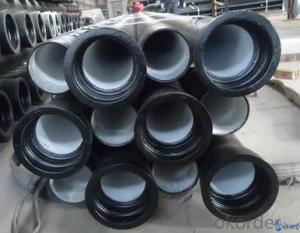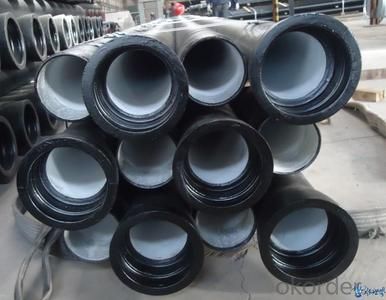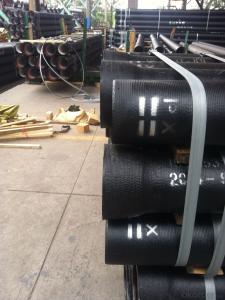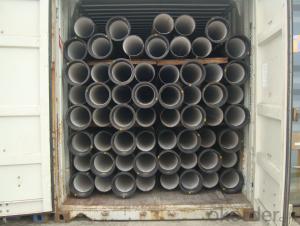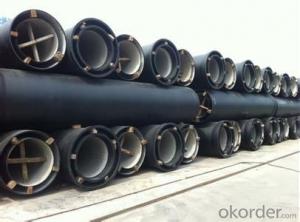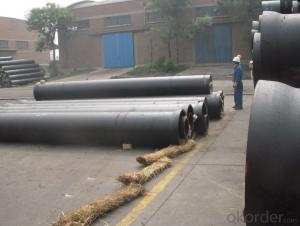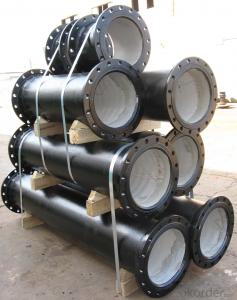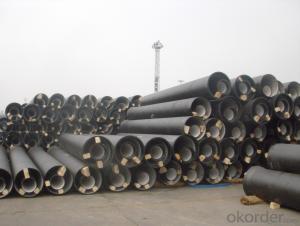DUCTILE IRON PIPES AND PIPE FITTINGS K8 CLASS DN900
- Loading Port:
- Tianjin
- Payment Terms:
- TT OR LC
- Min Order Qty:
- 22 pc
- Supply Capability:
- 3000 pc/month
OKorder Service Pledge
OKorder Financial Service
You Might Also Like
Material : Ductile Cast Iron
Size Range : DN 80mm to DN 2000mm
Unit Effective Length : 6m or 5.7m
Manufacture Standard: ISO 2531:1998/ EN 545:2006/EN 598:2007
Annual capacity : 200,000 tons
Coating Exterior: Zinc 130g/m2 according to ISO 8179-1 and bitumen coating 70 microns.
Cement Interior: Portland Cement/ High Alumina Cement/ Sulphate Resisting Cement Lining according to ISO 4179
Special requirements on external coating and internal lining can be applied
We also provide accessories such as SBR/EPDM rubber gaskets, lubricant paste, pipe caps, PE sleeves, etc.
Additional Parts:
Each pipe is strictly inspected according to related standard to ensure permanently high performance.
Easy Installation at site and service free for life
Long Service Lifespan
Quotation will arrive you within 24hours once we get your inquiry.
We guarantee offering you a competitive price.
A copy of original inspection reports of pipes will be offered after shipment.
Photos of loading process will be sent to the customer after shipment effect.
We will follow-up the delivery progress after shipment effect and update to the customer on weekly basis.
- Q: How to choose a ductile cast iron pipe with guaranteed quality
- Cutting testing: iron filing resistance, filing issued a "Shua" sound, little sticky file, debris was gray with a small amount of white spot, look at the particles of different size, with small particles of fine powder, finger milling, it is easy to make fingers black. Ductile iron filing: when the resistance ratio of gray iron is slightly larger, there are obvious "Shua" sound ", little sticky file, debris was gray with fine bright particles ranging in size but with large particles, with finger milling chips, can be dyed black to gray fingers, but more black the degree of light
- Q: What are the different methods for joining ductile iron pipe?
- There are several methods for joining ductile iron pipe, each with its own advantages and limitations. One common method is mechanical joint (MJ) coupling, which involves using a rubber gasket and a set of bolts and nuts to create a watertight seal between pipe sections. This method is relatively quick and easy to install, but it requires a skilled technician to ensure proper alignment and bolt tightening to prevent leakage. Another method is flanged joint, where the pipe ends are equipped with flanges that are bolted together using gaskets to create a tight seal. This method allows for easy disassembly and reassembly of pipe sections, making it suitable for applications that require frequent maintenance or modifications. However, it is more expensive and time-consuming compared to other methods. One widely used method is push-on joint (POJ), which involves using a rubber gasket and a special lubricant to slide the pipe ends together. This method provides a reliable and watertight seal, and it is relatively quick and easy to install. However, it requires proper alignment and care to avoid damaging the gasket during assembly. Another option is restrained joint (RJ), which uses a mechanical joint coupling with additional features to resist axial forces or thrusts. This method is commonly used in applications where the pipe is subject to internal pressure, external loads, or seismic activity. It provides a secure and rigid connection but may require specialized tools and training for installation. Finally, welding is another method for joining ductile iron pipe. It involves heating the pipe ends and melting a filler metal to create a permanent bond. This method provides a strong and durable connection, but it requires skilled welders and additional time for preparation, welding, and cooling. Welding is often used for specific applications, such as joining sections of pipe with different diameters or connecting to other materials. In summary, the different methods for joining ductile iron pipe include mechanical joint coupling, flanged joint, push-on joint, restrained joint, and welding. The choice of method depends on factors such as the application requirements, installation time, maintenance needs, and budget.
- Q: Are ductile iron pipes prone to leakage?
- Ductile iron pipes are generally considered to be resistant to leakage. This type of pipe is known for its durability and strength, making it less prone to leaks compared to other materials like PVC or even cast iron pipes. Ductile iron pipes are designed to withstand high pressure and can withstand heavy loads, making them ideal for various applications such as water supply, sewage systems, and industrial pipelines. The unique properties of ductile iron, including its flexibility and ability to absorb vibrations and shocks, contribute to its resistance against leaks. Ductile iron pipes have a high tensile strength, which means they can handle the internal and external pressures exerted on them without cracking or breaking. Furthermore, ductile iron pipes have joints that are designed to be leak-proof. These joints are typically sealed with rubber gaskets and connected using various methods such as push-on joints or restrained joints with mechanical couplings. These joint designs ensure a secure and watertight connection, reducing the risk of leaks. However, like any other type of pipe, ductile iron pipes can still experience leaks under certain circumstances. Factors such as age, corrosion, poor installation, or ground movement can contribute to the development of leaks over time. Regular maintenance and inspections are important to identify and address any potential issues that may lead to leaks. Overall, while ductile iron pipes are generally resistant to leakage and known for their reliability, it is essential to ensure proper installation, regular maintenance, and timely repairs to maximize their longevity and prevent any potential leaks.
- Q: Are ductile iron pipes suitable for use in cold climates?
- Ductile iron pipes are well-suited for cold climates due to their exceptional strength and durability. This makes them a reliable choice for various applications, such as water supply systems, sewage systems, and industrial piping. In freezing temperatures, ductile iron pipes are highly resistant to cracking or breaking. This is because of their unique metallurgical composition and structure. They possess a high tensile strength and can endure the expansion and contraction resulting from freezing and thawing cycles. Additionally, their smooth internal surface prevents ice or sediment buildup, ensuring efficient flow and reducing the risk of blockages. Overall, ductile iron pipes are a dependable and appropriate option for use in cold climates.
- Q: Do ductile iron pipes require special handling during transportation?
- Yes, ductile iron pipes do require special handling during transportation. Ductile iron pipes are known for their strength and durability, but they can be susceptible to damage if not handled properly. These pipes are heavy and can be quite large in size, so it is important to use appropriate lifting and handling equipment during transportation. Special care should be taken to avoid dropping or impacting the pipes, as this can lead to cracks or fractures. Additionally, pipes should be stored and transported in a way that prevents them from rolling or shifting, which could cause damage to the pipe coating or fittings. It is also recommended to protect the pipes from exposure to extreme temperatures or weather conditions during transportation. By following these guidelines and taking the necessary precautions, the risk of damage to ductile iron pipes during transportation can be minimized.
- Q: What is the average weight of ductile iron pipes?
- The weight of ductile iron pipes can differ based on their specific dimensions and specifications. However, as a general rule, the weight of ductile iron pipes usually falls within the range of 50 to 200 pounds per foot. Various factors, including the pipe's diameter, wall thickness, and length, affect its weight. It is essential to understand that these weights are averages, and the actual weight of a particular ductile iron pipe may differ. To accurately determine the weight of a ductile iron pipe, it is recommended to consult the manufacturer's specifications or engineering guidelines.
- Q: What do ductile iron pipes need to connect with three? Can I contact it directly?
- Because the interface material used in the old process is poisonous, especially in the water supply pipeline, environmental protection requires a new process now
- Q: Why is the cast iron tube lined with cement? Under what circumstances are ductile iron pipes lined with cement, and under what circumstances do not have to be lined with cement?
- The cement lining protects the water quality, reduces the head loss and improves the service life of the spheroidal graphite pipe. As long as the water delivery hose is used, the cement lining must be used. There is no lining cement for conveying air.
- Q: Can ductile iron pipe be used for cooling water systems?
- Yes, ductile iron pipe can be used for cooling water systems. Ductile iron pipes are known for their high strength and durability, making them suitable for various applications, including cooling water systems. They have excellent resistance to corrosion, which is important in preventing damage and maintaining the efficiency of the cooling water system. Additionally, ductile iron pipes can handle high-pressure and high-temperature conditions, making them a reliable choice for this purpose.
- Q: What pipe can be used to replace the cast iron pipe in the water supply? Thank you
- According to the casting method, it is divided into continuous cast iron pipe and centrifugal cast iron pipe, in which the centrifugal cast iron pipe is divided into sand mould and metal type two kinds. Divided into gray cast iron pipe and nodular cast iron pipe according to different material. According to the interface form, it is divided into flexible interface, flange interface, self anchored interface, rigid interface and so on. Among them, the flexible iron pipes rubber sealing ring; flange interface cast iron pipe flange fixed in the rubber pad, the flange gasket sealing; rigid interface cast iron pipe socket is large, straight pipe is inserted, sealed with cement, this technology has been basically eliminated.
Send your message to us
DUCTILE IRON PIPES AND PIPE FITTINGS K8 CLASS DN900
- Loading Port:
- Tianjin
- Payment Terms:
- TT OR LC
- Min Order Qty:
- 22 pc
- Supply Capability:
- 3000 pc/month
OKorder Service Pledge
OKorder Financial Service
Similar products
Hot products
Hot Searches
Related keywords
